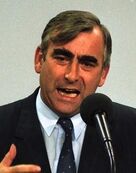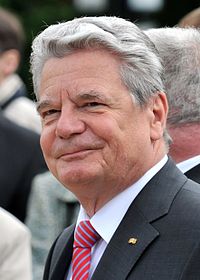National Consolidation Party
National Consolidation Party Nationale Konsolidierungspartei | |
|---|---|
 | |
| Leader | Otto von Hößlin |
| Deputy Leader | Jörg Bullmann |
| Founder | Konstantin Vogel |
| Founded | 13th May 1954 |
| Merger of | KP, NLP, KSP |
| Headquarters | 17 Jorganberg Road, Westbrucken, Werania |
| Youth wing | New Generation Forum |
| Membership | 101,463 |
| Ideology | Conservatism National conservatism Liberal conservatism Social conservatism Sotirian democracy Economic liberalism Economic nationalism Soft-Euclescepticism |
| Political position | Centre-right to right-wing |
| Euclean Parliament group | ACDE |
| Colors | Orange, blue |
| Volkstag | 244 / 545
|
| Herrstag | 77 / 349
|
| Landtags/Seimas | 265 / 1,151
|
| Euclean Parliament | 27 / 122
|
The National Consolidation Party (Weranian: Nationale Konsolidierungspartei) commonly abbreviated to the NKP is a conservative political party in Werania. It is currently the largest party in the country.
Formed in 1954 as a merger of anti-socialist political parties with the intention to represent the right-wing of the political spectrum, the NKP under Konstantin Vogel firmly established itself as the main party operating within an asymmetric two-party system with the NKP competing with a range of left-wing opposition parties. The NKP served in government from its foundation in 1954 to 1963 when under Adolf Stahl it lost government to a coalition of the left-wing opposition. It returned to government in 1970 when it would rule for nine years under three different Chancellors - Sigmar Welskopf-Henrich, Johannes Zollitsch and Albrecht Spaemann.
In 1979 after economic difficulties the NKP would enter opposition for a 20 year period as it became the rival of the governing party, the Social Democratic Radical Party of Werania. During this period in opposition the NKP would become incredibly divided between its traditional Sotirian democratic faction and a new right faction focused more on right-wing populism and economic liberalism. In 1999 the NKP under moderate leader Rasa Šalaševičiūtė led the NKP to a victory against the SRPO. Šalaševičiūtė implemented conservative fiscal policies, privatising industry and reinvesting it into supporting tech startups. Dealing with economic collapse in 2005 Šalaševičiūtė implemented austerity policies avoiding a bailout from the Euclean Community. In 2007 she led the NKP to a coalition government where Šalaševičiūtė supported Euclean integration and greater fiscal liberalisation. Resigning in 2009, her successor Dietrich Wittmann was unable to gain re-election placing it back into opposition.
In 2015 Otto von Hößlin became NKP leader. He has under the influence of deputy leader Jörg Bullmann moved the party to the populist right, supporting economic nationalism, social conservatism and soft-Euclescepticism. In 2019 the party became the largest in the Volkstag and is expected to form the next government of Werania.
The NKP is a member of the Alliance of Conservatives and Democrats in Euclea. A centre-right party, the NKP is seen as more socially conservative and economically interventionist than other parties within the ACDE.
History
Formation
The NKP was founded as a merger of the Conservative Party (KP), National Liberal Party (NLP) and the Catholic Social Party in 1957 by KSP Chairman and Chancellor Konstantin Vogel. The three parties - representing monarchist conservatism, classical liberalism and Sotirian democracy respectively - had represented mainstream right-wing politics in Werania having all been at some point dominant in Weranian politics since the country's unification in 1842. Between 1937 to 1950 (alongside the Weranic Farmers' Bloc and later the Weranic Reich Party) the three parties governed the country as part of the National Bloc. The bloc during the 1940's became increasingly authoritarian as a result of colonial wars that saw a destabilisation of the state culminating in the failed Colonels putsch and the break up of the National Bloc. The 1950 election saw the KP and NLP collapse as the KSP formed the Tripartite coalition with the centre-left Social Democratic Party of Werania (SPO) and the Weranic Section of the Workers' International (OSAI).

The Tripartite government commanded large majorities in the 1950 and 1953 elections implementing several progressive reforms as well as leading Werania into the Euclean Community. However the government suffered from internal tensions due to the alliance of urban socialists with rural conservative Catholics. In 1955 Konstantin Vogel - an outspoken critic of the tripartite government - became KSP leader. Legislation to increase trade union influence in the economy gave the KSP pretext to end the coalition leading to a vote of no confidence in the government that passed. The subsequent election saw the parties of the old National Bloc (KSP, KP and NLP) secure a majority leading to Vogel to become Chancellor.
Vogel's KSP-KP-NLP government implemented moderate policies, creating a social market economy based on the doctrine of Catholic social teachings. The new government followed a mostly Keynesian economics with an active fiscal and monetary policy ensuring there was low unemployment, moderate inflation, an expansion of the welfare state, the maintenance of the nationalised natural monopolies from the Tripartite government and income redistribution through public works projects. Nevertheless the government did still pursue some traditional conservative policies such as privatising state-owned breweries.
In the runup to the 1959 there were concerns of OSAI becoming the largest party and possibly forming a government with the SPO. Amongst the three coalition parties there was a feeling that the decline in both monarchist conservatism and classical liberalism meant the three parties increasingly came to resemble each other supporting Weranic nationalism, free-market economics and Catholic social values. As such in 1957 Vogel alongside KP and NLP leaders Walther Ritter von Dittmann and Gottfried von Litzmann announced the creation of the National Consolidation Party which would be a "big-tent" party representative of right-wing politics in Werania. The NKP subsequently formed a close relationship with the Solarian Catholic church and Catholic trade unions in order to boost its outreach to the electorate gathering supporters from all economic and social backgrounds.
Early years
The NKP in its first election in 1959 scored a decisive victory getting 302 of 586 seats enabling it to govern with a majority. Like the preceding National Bloc the NKP benefited from divisions in the left with the OSAI, SPO and Radical Party often competing for votes. As well as that parties to the right of the NKP such as the ORP and OBb were seen as being far-right in character meaning that the NKP was able to present itself as the only credible non-socialist political force in the country.
The party's big-tent nature meant it primarily promoted centre-right policies with former KSP parliamentarians becoming the dominant tendency. Nevertheless the party still exhibited ideological diversity particularly on the issue of the Euclean Community, ranging from pro-EC federalists to proponents of souverainism. Vogel, a moderate pro-Eucleanist, focused on sound economic management through a promotion of private enterprise and competition between Euclean nations.
In 1963 Vogel announced his retirement from politics preceding elections that year after developing early signs of lung cancer. His successor was Adolf Stahl who shared much of his centre-right positions declaring the party stood against the "revolutionary radicalism" of the OSAI and SPO. In the 1963 election the NKP secured another majority government with 309 seats. However whilst the 1960's were marked by economic prosperity there were shifts in social attitudes with the rise of second-wave feminism, the new left and immigration from former Euclean colonies. The NKP was largely unresponsive to these social changes shifting to a gradual loss of support.
Prior to the 1966 election economic growth stalled leading to Stahl to cut public expenditure, leading to the NKP to dip in popularity. As such in 1966 the NKP lost its majority in the Reichstag getting only 252 seats, albeit remaining the largest party by a large margin (the second ranked party, the OSAI, gained only 179 seats). Although the NKP could've formed a majority government with the SPO party leaders refused this possibility with NKP Finance Minister Sigmar Welskopf-Henrich declaring that the NKP "doesn't do coalitions". As such a left-wing cabinet was formed of the OSAI, SPO and Radical Party (RP) with SPO leader Rudolf Wiefelspütz becoming Chancellor and the NKP entering opposition. Stahl resigned as NKP leader in 1967 and was replaced by Welskopf-Henrich.
The party was widely seen to be weak in opposition but benefited from divisions within the Wiefelspütz government. At the 1970 election the NKP under Welskopf-Henrich secured a majority of 314 seats despite Welskopf-Henrich's wooden personality. Welskopf-Henrich continued moderately progressive social reforms whilst co-currently implementing budget cuts and reducing some of the welfare programmes started by the previous government, in line with policies pursued by previous NKP governments.
Welskopf-Henrich was Chancellor during the 1972 student protests which started due to the government's controversial control over university curriculum's. The protests eventually became a broader movement for social justice and economic equality with the Amalgamated Federation of Trade Unions holding a wildcat general strike over the government's control over the upper echelons of the trade union movement. The country briefly came to an economic standstill with the government fearing revolution; as a result Welskopf-Henrich resigned as Chancellor whilst calling a snap election. His successor was Johannes Zollitsch, a charismatic but controversial minister accused of indulging in right-wing populism. Calling on the "silent majority to vote against socialism" Zollitsch led the NKP to a narrow victory in the 1972 election which saw losses for all establishment parties to newcomers such as the League for Democratic Socialists and the Modern Centre Party (PMZ).

Despite his bullish rhetoric Zollitsch was credited with creating a dialogue with trade unions and student groups following the protests. A charismatic politician known for his straight-talking style Zollitsch was seen as representative of the NKP's core rural base being socially conservative whilst populist on economic issues and nationalist in foreign affairs, being critical of Euclofederalism. Zollitsch modernised the party's electoral apparatus, using television extensively crafting an image of himself as a modern leader who focused on long term development.
As Chancellor Zollitsch attempted to oversee large infrastructure projects, most ambitiously aiming to oversee a shift in energy production from fossil fuels to nuclear energy. However under his Chancellorship the economy started to slow down due to stagflation and a decline in Werania's steel industry, which had driven the Weranian economy since the 1860's. Zollitsch's government responded with implementing more comprehensive incomes policy and cutting public service wages, leading to tensions between the NKP and its traditional trade union partner, the Confederation of Catholic Labour. The poor economic situation meant the plans to move to nuclear energy were dropped.
Nevertheless in 1975 Zollitsch led the NKP to its greatest electoral victory with 52% of the vote and 325 seats, an effort largely seen as down to Zollitsch's personal popularity. However several factors would lead to the NKP to enter a decline over the 1975-79 term. Zollitsch's divisive political style led to several voters to desert the NKP whilst the emergence of centrist forces such as the PMZ would present an attractive alternative to what was seen as an increasingly right-wing NKP. Most damaging was the merger of the SPO and the RP into the Social Democratic Radical Party of Werania (SRPO) in 1977 which emerged as the first big tent centre-left party in the country's history.
In 1976 due to a balance of payments crisis Zollitsch was forced to devalue the Reichsmark - whilst economically sound the move led to widespread public dissatisfaction resulting in Zollitsch to resign in 1977, being succeeded by the Foreign Minister Albrecht Spaemann.

Spaemann continued the policies of Zollitsch but was forced to cut public spending to deal with the recession, most notably slashing agricultural subsidies. As well as this Spaemann was seen as uncharismatic and confrontational to trade unions, leading to more frequent strikes and economic disruption during the late 1970's. The emergence of SRPO leader Ludolf Ostermann saw the NKP increasingly regarded as a party of old men out of touch with younger voters. In the 1979 election the NKP remained the largest party with 186 seats whilst the SRPO overtook the OSAI for the first time as the second largest party, with the two parties together getting the best result ever for the Weranic left since the popular front took power in 1915. As a result of the NKP losing its majority Ostermann formed a left-wing coalition between the SRPO and the OSAI with Spaemann resigning as NKP leader in 1980.
Wilderness years
Modern history
Ideology
The National Consolidation Party is seen as a catch-all party identifying as a "broad church party of society". The NKP was formed to represent the predominantly rural Catholic community and as such adopted policies in spirit with Sotirian democratic and agrarian philosophy. Over time it has developed into a centre-right conservative party. T NKP tends to be more conservative in social matters and interventionist in economic matters then the majority of centre-right parties in the ACDE. The NKP is a strong proponent of subsidiarity.
On economic matters, the NKP is strongly influenced by ordoliberalism, being the main party responsible for the creation of Werania's social market economy. Since the 1980's the NKP has promoted neoliberal economic policies such as privatisation and deregulation. Generally the NKP's economic policies have been described as populist due to their support of high agricultural subsidies, low taxes and generous social spending.
On social policy, the NKP has been traditionally seen as conservative opposing legalised euthanasia, supporting greater restrictions on abortion, favouring tight immigration laws and supporting nationalist policies. However, the NKP has generally been pragmatic in certain areas promising in the 2015 election not to amend the current laws surrounding abortion.
On foreign policy the NKP for much of its history has been moderately Euclesceptic party, with their position being described as supporting souverainisme. The NKP currently support reforming the Euclean Community to be more focused on economic rather than political integration. They strongly support increasing defence spending.
Leaders
| No. | Name (Born–Died) |
Portrait | Term in Office | Notes | |
|---|---|---|---|---|---|
| 1 | Konstantin Vogel (1898-1980) |
 |
13 May 1957 | 16 March 1963 | Served as Chancellor from 1957-1963. |
| 2 | Adolf Stahl (1910-2002) |
 |
16 March 1963 | 27 July 1967 | Served as Chancellor from 1963-1967. |
| 3 | Sigmar Welskopf-Henrich (1902-1986) |
 |
27 July 1967 | 7 May 1972 | Served as Chancellor from 1970-1972. |
| 4 | Johannes Zollitsch (1914-1988) |
 |
7 May 1972 | 14 March 1977 | Served as Chancellor from 1972-1977. |
| 5 | Albrecht Spaemann (1924-2007) |
 |
14 March 1977 | 30 March 1980 | Served as Chancellor from 1977-1980. |
| 6 | Maximilian Frommel (1931-2016) |
 |
30 March 1980 | 18 September 1983 | First NKP leader not to become Chancellor. |
| 7 | Horst von Ingenohl (1932-1990) |
 |
18 September 1983 | 4 May 1987 | |
| - | Markus Müller (1940-2018) |
 |
4 May 1987 | 17 September 1987 | Interim leader |
| 8 | Edmund Blaurock (1934-2003) |
 |
17 September 1987 | 24 May 1996 | |
| 9 | Rasa Šalaševičiūtė (1954-) |
 |
24 May 1996 | 12 July 2009 | Served as Chancellor from 1999-2009 |
| 10 | Dietrich Wittmann (1946-) |
 |
12 July 2009 | 24 November 2011 | Served as Chancellor from 2009-2011 |
| 11 | Wilhelm von Merkatz (1954-) |
 |
24 November 2011 | 15 June 2014 | The only leader never to lead the party in a general election. |
| 12 | Günter Schaefer (1956-) |
 |
15 June 2014 | 3 August 2015 | |
| 13 | Otto von Hößlin (1952-) |
 |
3 August 2015 | Incumbent | Serving as Chancellor 2019-present. |









